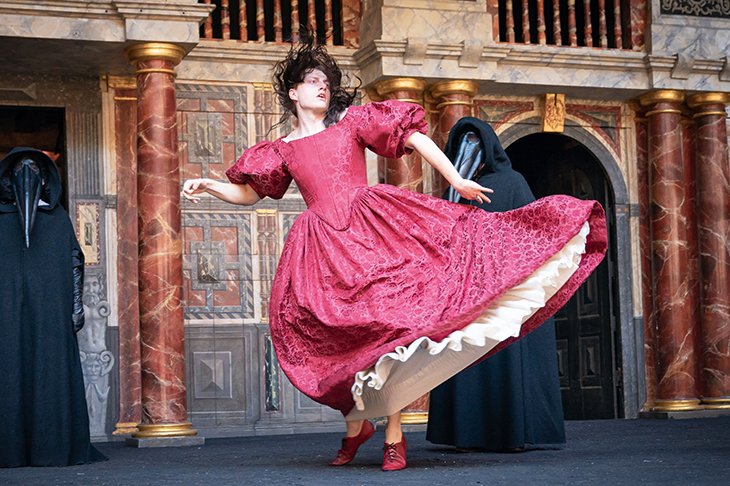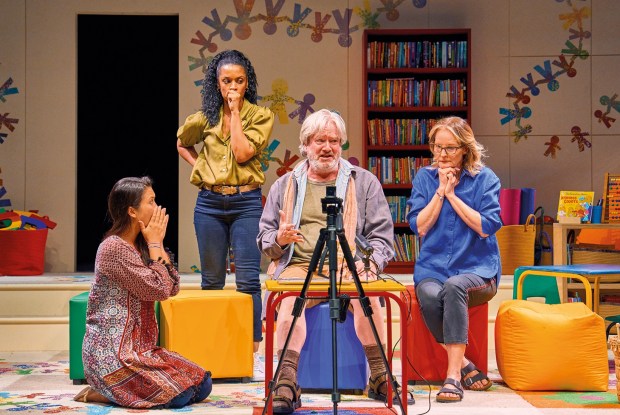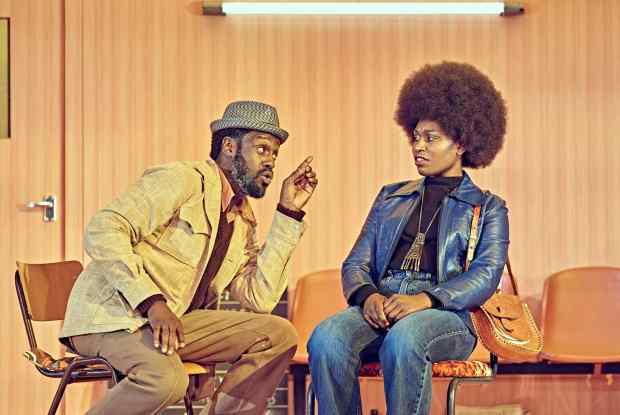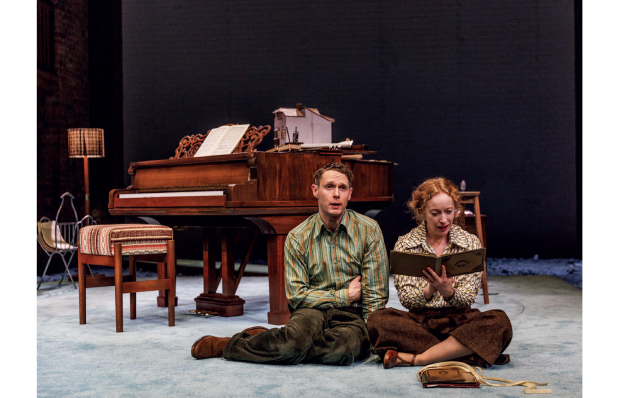Sylvia, the Old Vic’s musical about the Pankhurst clan, has had a troubled nativity. Illness struck the cast during rehearsals. Press night was postponed by a week. On the evening of the delayed performance, the show was cancelled just before curtain-up. We were told that a ‘concert version’ would be presented with understudies filling certain roles and with scripts on stage to prompt imperfect memories. I saw no scripts. And the absence of key performers made no discernible difference. This looked to me like the A-team. The director, Kate Prince, has a terrific show on her hands and although the introductory run has ended, the material can only get stronger as she continues to refine and improve it.
The story focuses on the tensions between Sylvia, a pacifist, and her mother Emmeline, who favoured direct action and had a weird fetish for violence. When the first world war broke out in 1914, Emmeline cancelled the suffrage campaign and ordered her supporters to distribute white feathers to unenlisted men. Because the show makes no claim to be a documentary it takes copious liberties with history. One example. The National League For Opposing Of Woman-Suffrage is presented as an all-male group when in fact its board was balanced between the sexes, and its general membership was predominantly female. To dramatise the political struggle, the script singles out Winston Churchill as the chief opponent of the Pankhursts. Not everyone will sympathise with Delroy Atkinson’s portrayal of him as a swaggering buffoon who seems frightened of his mother and is sneakily discourteous to his wife. In one puzzling scene the two women join forces and compel Winston to refrain from adding extra sugar to his tea. But the whole world knows that he drank whisky from daybreak onwards so it’s unclear why his glucose levels should be a cause of concern.
Other minor faults might be addressed. The loss of a Pankhurst son to polio is an irrelevance. The male cameos could benefit from some pruning. Besides Churchill we also meet Asquith, Lloyd George, Lord Curzon, Lord Cromer, George Lansbury, H.G. Wells and Bernard Shaw. When Jade Hackett (playing Churchill’s American mother) first arrives on stage she does a hip-jiggling pastiche of a Beyoncé disco-dervish. This looks like a witty homage to the rumour that Lady Churchill bedded anyone who could advance her son’s career. But when Hackett speaks her lines she uses an English accent. Why not American? The show’s outstanding feature is the music, which has a broad palette and embraces soul, disco, funk and rap. As with Hamilton, the combination of rousing songs and the spirit of political rebellion at a turning-point in history is irresistible. More than that, it’s magical. At the end of the show the crowd rose in a frenzy of applause. And this, remember, was a last-minute version offered by the actors as a gesture of thanks to the audience for showing up. The Old Vic may have stumbled on the new Les Mis.
Eyam is a Restoration tragedy which opens with a cleric being hanged. A predictable scene like this is an ideal opportunity for a dramatist to grab the audience’s attention and to tease them by throwing in surprises, shocks, delays, interruptions or dramatic reversals. Anything really. The writer, Matt Hartley, ignores this opportunity and develops the scene as if it were no more dramatic than a man exiting a library.
The play is a tribute to his hometown, Eyam, in Derbyshire, which was visited by plague in 1665 and whose brave inhabitants chose to stay and die rather than flee and infect the surrounding community. Very noble, of course, but the show is overlong and badly focused. It takes 70 minutes for the infection to arrive and the build-up involves lots of dreary characters capering about on stage shouting their lines. There’s a greedy landlord, a stuck-up priest, a melancholy widower (confusingly played by a woman) and an angry bumpkin waving a spade around.
The olde-worlde dialogue works well enough and is almost free of anachronisms, apart from the swearing, which sounds wrong and artless. The Globe should think twice before hiring actors to stand on Shakespeare’s stage and say ‘fuck this’ and ‘fuck that’. Autumn breezes have robbed the Southbank of its midsummer cheer and this play suits the chillier mood. It ends with an eight-minute scene in which 273 victims’ names are read out. Halfway through I began to envy the guy who got hanged at the start.
Got something to add? Join the discussion and comment below.
Get 10 issues for just $10
Subscribe to The Spectator Australia today for the next 10 magazine issues, plus full online access, for just $10.
You might disagree with half of it, but you’ll enjoy reading all of it. Try your first month for free, then just $2 a week for the remainder of your first year.














Comments
Don't miss out
Join the conversation with other Spectator Australia readers. Subscribe to leave a comment.
SUBSCRIBEAlready a subscriber? Log in